#Edith Dombey
Text
Edith Dombey did nothing wrong.
3 notes
·
View notes
Text
Edith Dombey is the Dickens' most badass female character and it's a crime not more people know about her.
1 note
·
View note
Text
We’re still voting to decide our next book here at Dickens Daily! Check the notes to find the poll to vote. Our options are as below, along with blurbs and the dates that they would go out.
The voting will close on July 4th 2023
Dombey and Son (October 1856/2023 to April 1848/2025)
A compelling depiction of a man imprisoned by his own pride, Dombey and Son explores the devastating effects of emotional deprivation on a dysfunctional family. Paul Dombey runs his household as he runs his business: coldly, calculatingly and commercially. The only person he cares for is his little son, while his motherless daughter Florence is merely a 'base coin that couldn't be invested'. As Dombey's callousness extends to others, including his defiant second wife Edith, he sows the seeds of his own destruction.
Little Dorrit (December 1855/2023 to June 1857/2025)
A masterly evocation of the state and psychology of imprisonment, Little Dorrit is one of the supreme works of Dickens's maturity. It follows Arthur Clennam who, returning to England after many years abroad, takes a kindly interest in Amy Dorrit, his mother's seamstress, who was born and raised in the Marshalsea where her father has long been imprisoned for debt. As Arthur soon discovers, the dark shadow of the prison stretches far beyond its walls to affect the lives of many, from the kindly Mr Pancks, the reluctant rent-collector of Bleeding Heart Yard, to the bureaucratic Barnacles in the Circumlocution Office and Merdle, an unscrupulous financier.
Martin Chuzzlewit (January 1843/2024 to July 1844/2025)
Greed has led wealthy old Martin Chuzzlewit to become suspicious and misanthropic, leaving his grandson and name-sake to make his own way in the world. And so young Martin sets out from the Wiltshire home of his supposed champion, the scheming architect Pecksniff, to seek his fortune in America. In depicting Martin's journey Dickens created many vividly realised figures, from Martin's optimistic manservant Mark Tapley to the drunken and corrupt private nurse Mrs Gamp. With its portrayal of greed, blackmail and murder, and its searing satire on America, Dickens's novel is a powerful and blackly comic story of hypocrisy and redemption.
Barnaby Rudge (February 1841/2024 to November 1841/2024)
Set against the backdrop of the Gordon Riots of 1780, Barnaby Rudge is a story of mystery and suspense which begins with an unsolved double murder and goes on to involve conspiracy, blackmail, abduction and retribution. Through the course of the novel fathers and sons become opposed, apprentices plot against their masters and anti-Catholic mobs rampage through the streets. With its dramatic descriptions of public violence and private horror, its strange secrets and ghostly doublings, Barnaby Rudge is a powerful, disturbing blend of historical realism and Gothic melodrama.
#charles dickens#dickens#tumblr book club#dickens daily#dracula daily#I'm sorry for using the dracula tag this is the only time I'm doing it#I just want to make sure anyone who might be interested still has a chance#the poll is still *very* much still to play for
11 notes
·
View notes
Text
into my arms
When she was young, Lucy always thought she’d feel the most like herself at the front of a classroom, teaching scores of students about Bertha Mason and Edith Dombey and Lucy Westenra. She thought that’s where she’d be the strongest, the most untouchable, the most loved. School had always been more sacred to her than the creaky pew in the back of St. Catherine’s where she knelt for Communion beside her first-period peers. She felt exposed there, vulnerable to the elements. But in school, she didn’t just weather the storm. She was in charge of it. And that was supposed to be that. Her dominion. Her safest place. Her true self. And she does feel strong when she talks Victorian England to a group of wide-eyed, scribbling students.
It’s just that she feels equally strong at home, in her living room, with two beautiful daughters who call her Mom.
Much before she and Will found out they were going to have Elenore, Lucy would have shuddered at the thought of feeling so much like herself in the role of mother. Whenever she thought of motherhood, she thought of Roger Waters’s mewling Jocasta voice on The Wall (Come to Mother, baby, let me hold you in my arms!). She used to roll her eyes at all the mothers at St. Catherine’s who soullessly swore that motherhood was the greatest joy in their lives. And she’s still not sure she agrees. For Lucy, the greatest joy of her life is just being alive. But her girls are part of that life. And they are such a beautiful part. Elenore, with her incredible train of thought and silver tongue; Emma, with her precocious discernment and early love for classical Hollywood. They are part of Lucy’s life, Lucy’s self, and she is so proud to have raised them … so proud to know them. If they were anyone else’s daughters, she’d be so jealous.
Elenore is sixteen now, and Emma, just five. But no matter how old they get, whenever Lucy looks at them, she wants to say the same thing: Come into my arms and stay for a while.
Eventually, she knows they’ll have to leave. It won’t change much. Won’t change that she’s their mother. Won’t change that she found a part of herself through knowing them … that she’ll always learn more about herself by watching them. Won’t change at all.
(part of @nosebleedclub october challenge -- day i!)
6 notes
·
View notes
Text
Also I was previously assuming there was going to be a fairly standard adultery plotline, but with the persistent references to Edith Dombey and the recent reference to Desdemona, I'm now thinking it will be a perceived-adultery plotline instead... we shall see...
0 notes
Link
#19.Jahrhundert#deutsch#England#Erbe#Geld#Geschäft#Gesellschaft#Hoffnung#Kind#Nachfolger#Sohn#Töchter#Tod#Trauer#Unternehmen#Viktorianismus
0 notes
Text
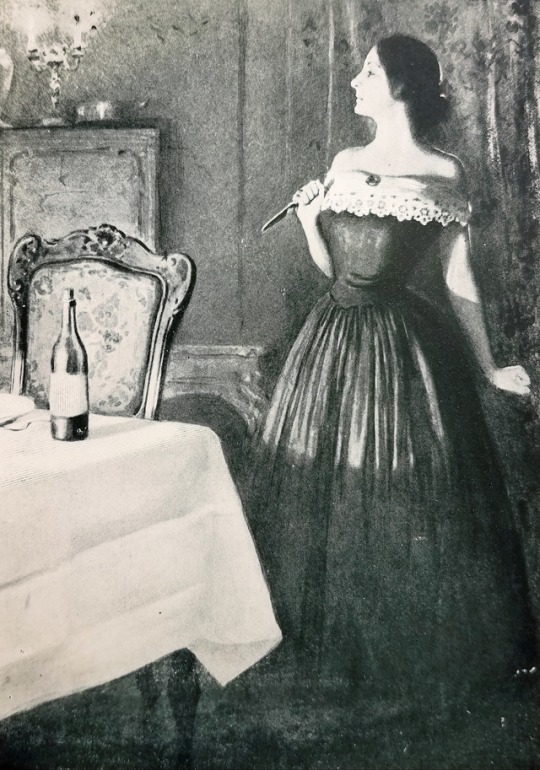
From our stacks: “’Stand still!’ she said, ‘or I shall murder you’” from Heroines of Fiction By W. D. Howells. With Illustrations by H. C. Christy, A. I. Keller and others. Volume I. New York and London: Harper & Brothers, 1901.
#edith dombey#charles dickens#illustration#books#book illustration#book#literature#old books#murder#dickens#detroit public library
26 notes
·
View notes
Text
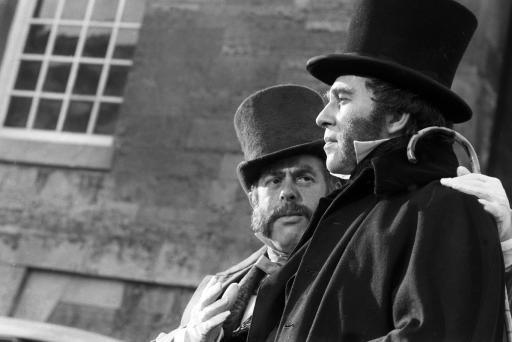
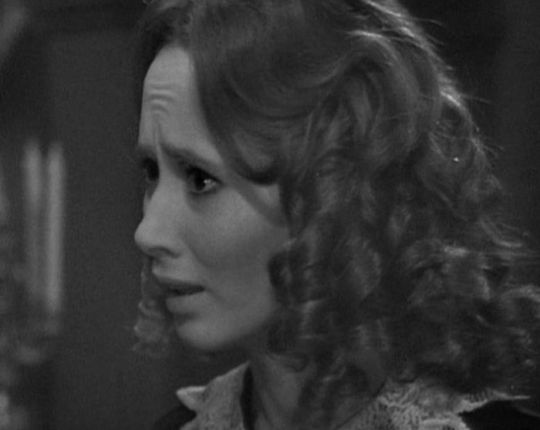
Dombey And Son: Edith Granger (1.5, BBC, 1969)
"Come sir, don't be thoughtful - it's a bad habit. Old Joe wouldn't be as tough as you see him if he had ever encouraged it. You're too great a man, Dombey, ever to be thoughtful! In your position, you're far above that kind of thing."
#Dombey and son#classic tv#1969#BBC#John Carson#Kara Wilson#Helen Fraser#David Garth#Davyd Harries#Sally home#Barbara Mitchell#william moore#Gary Raymond#clive swift#Marian Spencer#Christopher Sandford#Meadows white#Edward topps#John rudling#Ian price#Joan craft#Hugh Leonard#charles dickens#With Dombey jnr no more Dombey snr takes off for some respite in Leamington with old friend Major Bagstock. An unlikely seeming#Friend with his meaningless prattle and hint of slyness around the eyes: of course this also means new cast members. Swift is having the#Time of his life throwing everything into the garrulous and irresponsible major. The other big newcomer is Sally Home as Edith soon to be#I am sure the second Mrs Dombey. She isn't really given much to do in this first outing allowing Swift to steal their scenes away from her#Quite easily. Elsewhere Carker continues to be villainous and menacing in a sort of vague and undirected sort of way#And poor Florence is worried about the fate of Young Gay and his ship (dare I say.... A gay cruise...)
3 notes
·
View notes
Photo
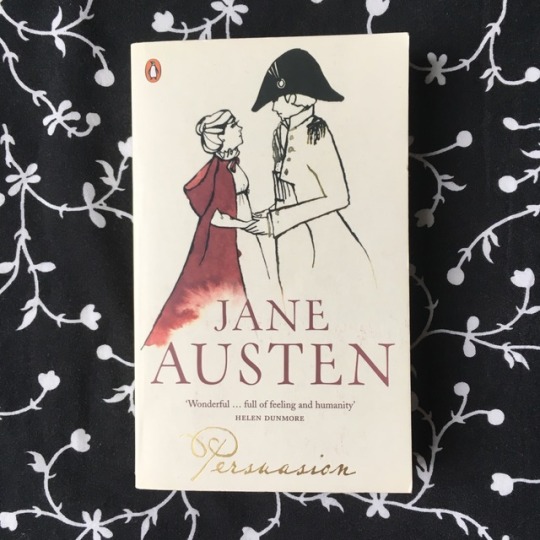
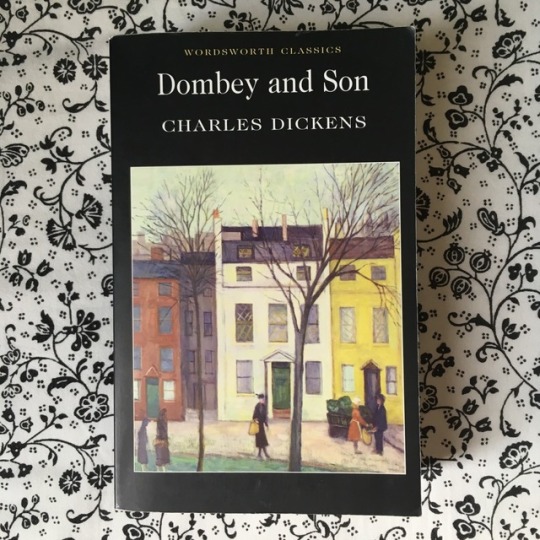
Week 32 Readings
Persuasion by Jane Austen
This was my second time reading this book. The first time was years ago. (At least 8 years! That’s so long! Also ironic, considering that’s how long it’s been since Anne and Fredrick broke off their engagement.) Long enough that I barely remembered what it was about, so it was a little like reading it for the first time again.
I definitely liked it better than last I read it. The ending still feels a little rushed, but it was an ending 9 years in the making, so they did deserve a quick resolution.
I don’t think I’ll wait so long before I read it again.
Dombey and Son by Charles Dickens
I love Edith and Florence, they both deserve so much better. I still have about 200 pages to go, and I hope they get it.
Another character I hope gets what they deserve is Mr. Carker (the manager). I hope someone pushes him in the Thames. My skin crawls every time there’s a scene with him. I honestly don’t think I’ve ever felt this much revulsion for a fictional character, not even Umbridge. The way he talk and behaves reminds me a little of Mr. Collins from Pride and Prejudice, except Mr Collins is just an idiot, and with Mr Carker there is real malevolence. You can feel it brewing between his words.
For Mr Dombey himself, I can only hope someone slaps the idea that women are just pretty accessories out of his head before the book ends. (Falling off his horse didn’t do the job, sadly)
2 notes
·
View notes
Link
Hard Times
'Now, what I want is, Facts. Teach these boys and girls nothing but Facts. Facts alone are wanted in life. Plant nothing else, and root out everything else.’
Coketown is dominated by the figure of Mr Thomas Gradgrind, school owner and model of Utilitarian success. Feeding both his pupils and his family with facts, he bans fancy and wonder from young minds. As a consequence his young daughter Louisa marries the loveless businessman and “bully of humility” Mr Bounderby, and his son Tom rebels to become embroiled in gambling and robbery. And, as their fortunes cross with those of free-spirited circus girl Sissy Jupe and victimized weaver Stephen Blackpool, Gradgrind is eventually forced to recognize the value of the human heart in an age of materialism and machinery.
This edition of Hard Times is based on the text of the first volume publication of 1854. Kate Flint’s introduction sheds light on the frequently overlooked character interplay in Dickens’s great critique of Victorian industrial society.
For more than seventy years, Penguin has been the leading publisher of classic literature in the English-speaking world. With more than 1,700 titles, Penguin Classics represents a global bookshelf of the best works throughout history and across genres and disciplines. Readers trust the series to provide authoritative texts enhanced by introductions and notes by distinguished scholars and contemporary authors, as well as up-to-date translations by award-winning translators.
Dombey and Son (Penguin Classics)
A darkly witty tale of two siblings' struggle to achieve happiness in the shadow of their father's pride
To Paul Dombey, business is all and money can do anything. He runs his family life as he runs his firm: coldly, calculatingly and commercially. The only person he cares for is his frail son, grooming him for entry into the family business; his daughter Florence, abandoned and ignored, craves affection from her unloving father, who sees her only as a 'base coin that couldn't be invested'. As Dombey's callousness extends to others - from his defiant second wife Edith, to Florence's admirer Walter Gay - he sows the seeds of his own destruction. Can this heartless businessman be redeemed? A compelling depiction of a man imprisoned by his own pride, Dombey and Son explores the devastating effects of emotional deprivation on a dysfunctional family and on society as a whole. In his introduction, Andrew Sanders discusses the character of Paul Dombey, business and family relationships in Dombey and Son and their similarities to Dickens's own childhood. This edition also includes a chronology, further reading, appendices, notes and the original illustrations by 'Phiz'.
For more than seventy years, Penguin has been the leading publisher of classic literature in the English-speaking world. With more than 1,700 titles, Penguin Classics represents a global bookshelf of the best works throughout history and across genres and disciplines. Readers trust the series to provide authoritative texts enhanced by introductions and notes by distinguished scholars and contemporary authors, as well as up-to-date translations by award-winning translators.
Bleak House (Penguin Classics)
Charles Dickens's masterful assault on the injustices of the British legal system
As the interminable case of 'Jarndyce and Jarndyce' grinds its way through the Court of Chancery, it draws together a disparate group of people: Ada and Richard Clare, whose inheritance is gradually being devoured by legal costs; Esther Summerson, a ward of court, whose parentage is a source of deepening mystery; the menacing lawyer Tulkinghorn; the determined sleuth Inspector Bucket; and even Jo, the destitute little crossing-sweeper. A savage, but often comic, indictment of a society that is rotten to the core, Bleak House is one of Dickens's most ambitious novels, with a range that extends from the drawing rooms of the aristocracy to the poorest of London slums. This edition follows the first book edition of 1853, and includes all the original illustrations by 'Phiz', as well as appendices on the Chancery and spontaneous combustion. In his preface, Terry Eagleton examines characterisation and considers Bleak House as an early work of detective fiction.
For more than seventy years, Penguin has been the leading publisher of classic literature in the English-speaking world. With more than 1,700 titles, Penguin Classics represents a global bookshelf of the best works throughout history and across genres and disciplines. Readers trust the series to provide authoritative texts enhanced by introductions and notes by distinguished scholars and contemporary authors, as well as up-to-date translations by award-winning translators.
A Christmas Carol and Other Christmas Writings (Penguin Classics)
A collection of stories of matchless charm and enduring popularity that enchanted listeners at Charles Dickens's public readings
Since it was first published in 1843 A Christmas Carol has had an enduring influence on the way we think about the traditions of Christmas. Dickens's story of solitary miser Ebenezer Scrooge, who is taught the true meaning of Christmas by the three ghosts of Christmas past, present and future, has been adapted into countless film and stage versions since it was first published. Dickens's other Christmas writings collected here include 'The Story of the Goblins who Stole a Sexton', the short story from The Pickwick Papers on which A Christmas Carol was based; The Haunted Man, a tale of a man tormented by painful memories; along with shorter pieces, some drawn from the 'Christmas Stories' that Dickens wrote annually for his weekly journals. In all of them Dickens celebrates the season as one of geniality, charity and remembrance. This new selection contains an introduction by distinguished Dickens scholar Michael Slater discussing how the author has shaped ideas about the Christmas spirit, original illustrations by 'Phiz' and John Leech, an appendix on Dickens's use of The Arabian Nights, a further reading list and explanatory notes.
For more than seventy years, Penguin has been the leading publisher of classic literature in the English-speaking world. With more than 1,700 titles, Penguin Classics represents a global bookshelf of the best works throughout history and across genres and disciplines. Readers trust the series to provide authoritative texts enhanced by introductions and notes by distinguished scholars and contemporary authors, as well as up-to-date translations by award-winning translators.
#Charles Dickens#A Christmas Carol#A Tale of Two Cities#Bleak House'#penguin classics#booklover#Good Reads#Reading
0 notes
Text
Edith Dombey had the most girlboss energy out of all of Charles Dicken's characters.
#she was powerful#she is beauty she is grace and she'll punch you in the face#edith dombey#dombey and son
6 notes
·
View notes
Quote
There is no slave in a market; there is no horse in a fair; so shown and offered and examined and paraded, Mother, as I have been, for ten shameful years," cried Edith, with a burning brow, and the same bitter emphasis on the one word. "Is it not so? Have I been made the by-word of all kinds of men? Have fools, have profligates, have boys, have dotards, dangled after me, and one by one rejected me, and fallen off, because you were too plain with all your cunning: yes and too true, with all those false pretences: until we have almost come to be notorious? The license of look and touch," she said, with flashing eyes, "have I submitted to it, in half the places of resort upon the map of England. Have I been hawked and vended here and there until the last grain of self-respect is dead within me, and I loathe myself? Has this been my late childhood? I had none before. Do not tell me that I had, tonight, of all nights in my life!"
Wasn't expecting to find a woman speaking this way about marriage in Charles Dickens' Dombey and Son
0 notes
Text
What the Dickens?
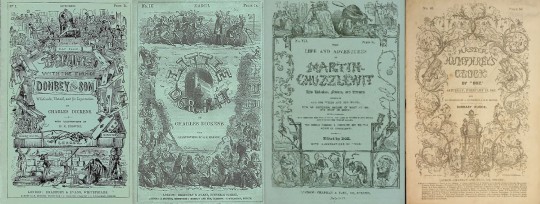
There are 24 hours remaining to vote for our next book - only one can win!
Remember to take note of how long the wait will be for each option after we finish Great Expectations in August, as well as how long the serialisation will continue for!
Dombey and Son (October 1856/2023 to April 1848/2025)
A compelling depiction of a man imprisoned by his own pride, Dombey and Son explores the devastating effects of emotional deprivation on a dysfunctional family. Paul Dombey runs his household as he runs his business: coldly, calculatingly and commercially. The only person he cares for is his little son, while his motherless daughter Florence is merely a 'base coin that couldn't be invested'. As Dombey's callousness extends to others, including his defiant second wife Edith, he sows the seeds of his own destruction.
Little Dorrit (December 1855/2023 to June 1857/2025)
A masterly evocation of the state and psychology of imprisonment, Little Dorrit is one of the supreme works of Dickens's maturity. It follows Arthur Clennam who, returning to England after many years abroad, takes a kindly interest in Amy Dorrit, his mother's seamstress, who was born and raised in the Marshalsea where her father has long been imprisoned for debt. As Arthur soon discovers, the dark shadow of the prison stretches far beyond its walls to affect the lives of many, from the kindly Mr Pancks, the reluctant rent-collector of Bleeding Heart Yard, to the bureaucratic Barnacles in the Circumlocution Office and Merdle, an unscrupulous financier.
Martin Chuzzlewit (January 1843/2024 to July 1844/2025)
Greed has led wealthy old Martin Chuzzlewit to become suspicious and misanthropic, leaving his grandson and name-sake to make his own way in the world. And so young Martin sets out from the Wiltshire home of his supposed champion, the scheming architect Pecksniff, to seek his fortune in America. In depicting Martin's journey Dickens created many vividly realised figures, from Martin's optimistic manservant Mark Tapley to the drunken and corrupt private nurse Mrs Gamp. With its portrayal of greed, blackmail and murder, and its searing satire on America, Dickens's novel is a powerful and blackly comic story of hypocrisy and redemption.
Barnaby Rudge (February 1841/2024 to November 1841/2024)
Set against the backdrop of the Gordon Riots of 1780, Barnaby Rudge is a story of mystery and suspense which begins with an unsolved double murder and goes on to involve conspiracy, blackmail, abduction and retribution. Through the course of the novel fathers and sons become opposed, apprentices plot against their masters and anti-Catholic mobs rampage through the streets. With its dramatic descriptions of public violence and private horror, its strange secrets and ghostly doublings, Barnaby Rudge is a powerful, disturbing blend of historical realism and Gothic melodrama.
#dickens daily#charles dickens#books#tumblr book club#little dorrit#dombey and son#martin chuzzlewit#barnaby rudge#the link will be in the notes#and is in the blog bio
5 notes
·
View notes
Quote
Note from Jeffrey this morning, who won't believe (positively refuses) that Edith is Carker's mistress. What do you think of a kind of inverted Maid's Tragedy, and a tremendous scene of her undeceiving Carker, and giving him to know that she never meant that?
Extract from a letter written by Charles Dickens
The Life of Charles Dickens, John Forster
1 note
·
View note
Link
#19.Jahrhundert#deutsch#England#Erbe#Geld#Geschäft#Gesellschaft#Hoffnung#Kind#Nachfolger#Sohn#Töchter#Tod#Trauer#Unternehmen#Viktorianismus
1 note
·
View note
Link
A Tale of Two Cities (Penguin Classics)
'It was the best of times, it was the worst of times...'
Charles Dickens's A Tale of Two Cities portrays a world on fire, split between Paris and London during the brutal and bloody events of the French Revolution. After eighteen years as a political prisoner in the Bastille the aging Dr Manette is finally released and reunited with his daughter in England. There, two very different men, Charles Darnay, an exiled French aristocrat, and Sydney Carton, a disreputable but brilliant English lawyer, become enmeshed through their love for Lucie Manette. From the tranquil lanes of London, they are all drawn against their will to the vengeful, bloodstained streets of Paris at the height of the Reign of Terror and soon fall under the lethal shadow of La Guillotine. This edition uses the text as it appeared in its first serial publication in 1859 to convey the full scope of Dickens's vision, and includes the original illustrations by H.K. Browne ('Phiz'). Richard Maxwell's introduction discusses the intricate interweaving of epic drama with personal tragedy.
For more than seventy years, Penguin has been the leading publisher of classic literature in the English-speaking world. With more than 1,700 titles, Penguin Classics represents a global bookshelf of the best works throughout history and across genres and disciplines. Readers trust the series to provide authoritative texts enhanced by introductions and notes by distinguished scholars and contemporary authors, as well as up-to-date translations by award-winning translators.
Hard Times
'Now, what I want is, Facts. Teach these boys and girls nothing but Facts. Facts alone are wanted in life. Plant nothing else, and root out everything else.’
Coketown is dominated by the figure of Mr Thomas Gradgrind, school owner and model of Utilitarian success. Feeding both his pupils and his family with facts, he bans fancy and wonder from young minds. As a consequence his young daughter Louisa marries the loveless businessman and “bully of humility” Mr Bounderby, and his son Tom rebels to become embroiled in gambling and robbery. And, as their fortunes cross with those of free-spirited circus girl Sissy Jupe and victimized weaver Stephen Blackpool, Gradgrind is eventually forced to recognize the value of the human heart in an age of materialism and machinery.
This edition of Hard Times is based on the text of the first volume publication of 1854. Kate Flint’s introduction sheds light on the frequently overlooked character interplay in Dickens’s great critique of Victorian industrial society.
For more than seventy years, Penguin has been the leading publisher of classic literature in the English-speaking world. With more than 1,700 titles, Penguin Classics represents a global bookshelf of the best works throughout history and across genres and disciplines. Readers trust the series to provide authoritative texts enhanced by introductions and notes by distinguished scholars and contemporary authors, as well as up-to-date translations by award-winning translators.
Dombey and Son (Penguin Classics)
A darkly witty tale of two siblings' struggle to achieve happiness in the shadow of their father's pride
To Paul Dombey, business is all and money can do anything. He runs his family life as he runs his firm: coldly, calculatingly and commercially. The only person he cares for is his frail son, grooming him for entry into the family business; his daughter Florence, abandoned and ignored, craves affection from her unloving father, who sees her only as a 'base coin that couldn't be invested'. As Dombey's callousness extends to others - from his defiant second wife Edith, to Florence's admirer Walter Gay - he sows the seeds of his own destruction. Can this heartless businessman be redeemed? A compelling depiction of a man imprisoned by his own pride, Dombey and Son explores the devastating effects of emotional deprivation on a dysfunctional family and on society as a whole. In his introduction, Andrew Sanders discusses the character of Paul Dombey, business and family relationships in Dombey and Son and their similarities to Dickens's own childhood. This edition also includes a chronology, further reading, appendices, notes and the original illustrations by 'Phiz'.
For more than seventy years, Penguin has been the leading publisher of classic literature in the English-speaking world. With more than 1,700 titles, Penguin Classics represents a global bookshelf of the best works throughout history and across genres and disciplines. Readers trust the series to provide authoritative texts enhanced by introductions and notes by distinguished scholars and contemporary authors, as well as up-to-date translations by award-winning translators.
Bleak House (Penguin Classics)
Charles Dickens's masterful assault on the injustices of the British legal system
As the interminable case of 'Jarndyce and Jarndyce' grinds its way through the Court of Chancery, it draws together a disparate group of people: Ada and Richard Clare, whose inheritance is gradually being devoured by legal costs; Esther Summerson, a ward of court, whose parentage is a source of deepening mystery; the menacing lawyer Tulkinghorn; the determined sleuth Inspector Bucket; and even Jo, the destitute little crossing-sweeper. A savage, but often comic, indictment of a society that is rotten to the core, Bleak House is one of Dickens's most ambitious novels, with a range that extends from the drawing rooms of the aristocracy to the poorest of London slums. This edition follows the first book edition of 1853, and includes all the original illustrations by 'Phiz', as well as appendices on the Chancery and spontaneous combustion. In his preface, Terry Eagleton examines characterisation and considers Bleak House as an early work of detective fiction.
For more than seventy years, Penguin has been the leading publisher of classic literature in the English-speaking world. With more than 1,700 titles, Penguin Classics represents a global bookshelf of the best works throughout history and across genres and disciplines. Readers trust the series to provide authoritative texts enhanced by introductions and notes by distinguished scholars and contemporary authors, as well as up-to-date translations by award-winning translators.
A Christmas Carol and Other Christmas Writings (Penguin Classics)
A collection of stories of matchless charm and enduring popularity that enchanted listeners at Charles Dickens's public readings
Since it was first published in 1843 A Christmas Carol has had an enduring influence on the way we think about the traditions of Christmas. Dickens's story of solitary miser Ebenezer Scrooge, who is taught the true meaning of Christmas by the three ghosts of Christmas past, present and future, has been adapted into countless film and stage versions since it was first published. Dickens's other Christmas writings collected here include 'The Story of the Goblins who Stole a Sexton', the short story from The Pickwick Papers on which A Christmas Carol was based; The Haunted Man, a tale of a man tormented by painful memories; along with shorter pieces, some drawn from the 'Christmas Stories' that Dickens wrote annually for his weekly journals. In all of them Dickens celebrates the season as one of geniality, charity and remembrance. This new selection contains an introduction by distinguished Dickens scholar Michael Slater discussing how the author has shaped ideas about the Christmas spirit, original illustrations by 'Phiz' and John Leech, an appendix on Dickens's use of The Arabian Nights, a further reading list and explanatory notes.
For more than seventy years, Penguin has been the leading publisher of classic literature in the English-speaking world. With more than 1,700 titles, Penguin Classics represents a global bookshelf of the best works throughout history and across genres and disciplines. Readers trust the series to provide authoritative texts enhanced by introductions and notes by distinguished scholars and contemporary authors, as well as up-to-date translations by award-winning translators.
0 notes